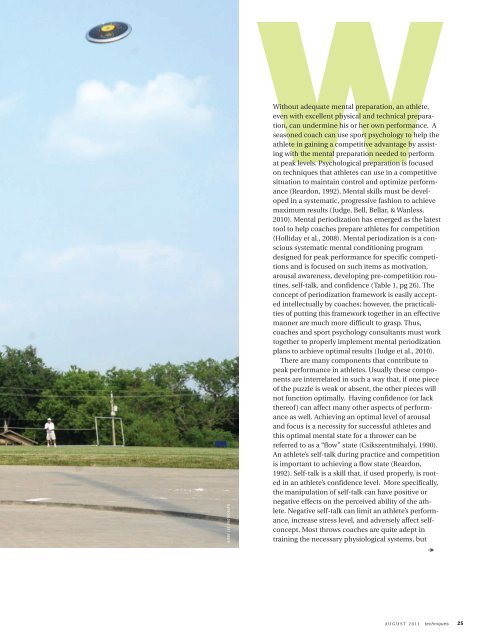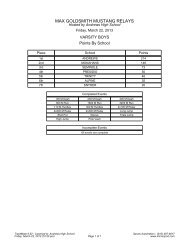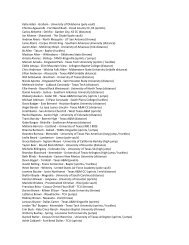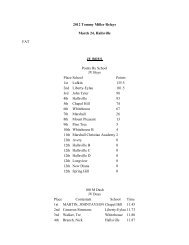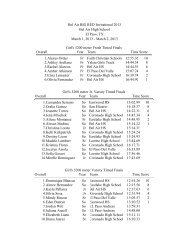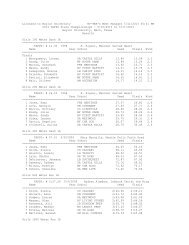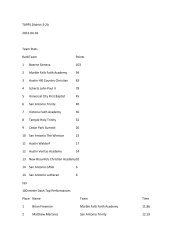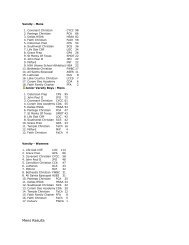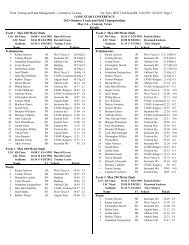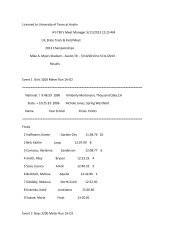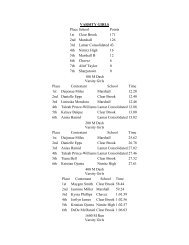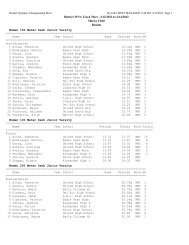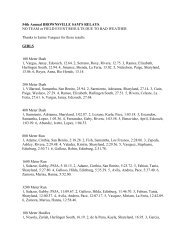1. PAGES 1-35 - Texas Track & Field Coaches Association
1. PAGES 1-35 - Texas Track & Field Coaches Association
1. PAGES 1-35 - Texas Track & Field Coaches Association
Create successful ePaper yourself
Turn your PDF publications into a flip-book with our unique Google optimized e-Paper software.
KIRBY LEE PHOTOGRAPH<br />
WWithout adequate mental preparation, an athlete,<br />
even with excellent physical and technical preparation,<br />
can undermine his or her own performance. A<br />
seasoned coach can use sport psychology to help the<br />
athlete in gaining a competitive advantage by assisting<br />
with the mental preparation needed to perform<br />
at peak levels. Psychological preparation is focused<br />
on techniques that athletes can use in a competitive<br />
situation to maintain control and optimize performance<br />
(Reardon, 1992). Mental skills must be developed<br />
in a systematic, progressive fashion to achieve<br />
maximum results (Judge, Bell, Bellar, & Wanless,<br />
2010). Mental periodization has emerged as the latest<br />
tool to help coaches prepare athletes for competition<br />
(Holliday et al., 2008). Mental periodization is a conscious<br />
systematic mental conditioning program<br />
designed for peak performance for specific competitions<br />
and is focused on such items as motivation,<br />
arousal awareness, developing pre-competition routines,<br />
self-talk, and confidence (Table 1, pg 26). The<br />
concept of periodization framework is easily accepted<br />
intellectually by coaches; however, the practicalities<br />
of putting this framework together in an effective<br />
manner are much more difficult to grasp. Thus,<br />
coaches and sport psychology consultants must work<br />
together to properly implement mental periodization<br />
plans to achieve optimal results (Judge et al., 2010).<br />
There are many components that contribute to<br />
peak performance in athletes. Usually these components<br />
are interrelated in such a way that, if one piece<br />
of the puzzle is weak or absent, the other pieces will<br />
not function optimally. Having confidence (or lack<br />
thereof) can affect many other aspects of performance<br />
as well. Achieving an optimal level of arousal<br />
and focus is a necessity for successful athletes and<br />
this optimal mental state for a thrower can be<br />
referred to as a “flow” state (Csikszentmihalyi, 1990).<br />
An athlete’s self-talk during practice and competition<br />
is important to achieving a flow state (Reardon,<br />
1992). Self-talk is a skill that, if used properly, is rooted<br />
in an athlete’s confidence level. More specifically,<br />
the manipulation of self-talk can have positive or<br />
negative effects on the perceived ability of the athlete.<br />
Negative self-talk can limit an athlete’s performance,<br />
increase stress level, and adversely affect selfconcept.<br />
Most throws coaches are quite adept in<br />
training the necessary physiological systems, but<br />
AUGUST 2011 techniques 25


